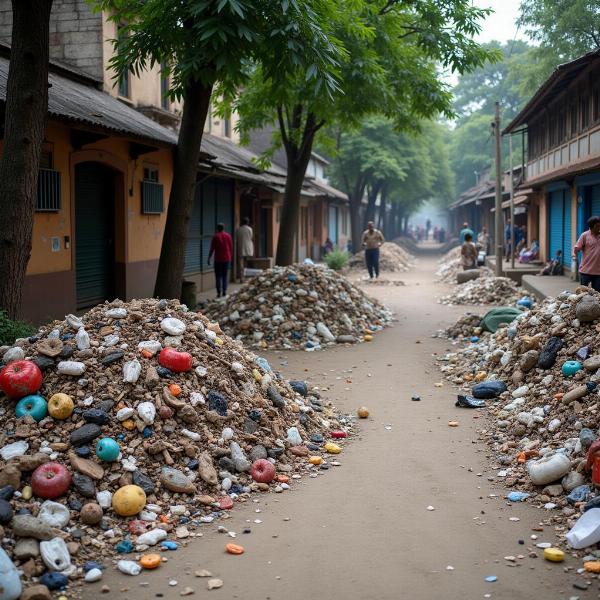The word “kachara” (कचरा) in Hindi translates to “garbage,” “trash,” or “rubbish” in English. Understanding the meaning of kachara goes beyond a simple translation; it delves into the cultural nuances and societal perceptions surrounding waste management in India. This article explores the various meanings and interpretations of kachara, its implications for daily life, and the evolving landscape of waste disposal in the country.
Beyond the Bin: Exploring the Different Meanings of Kachara
While the primary meaning of kachara revolves around discarded materials, the term can also be used metaphorically to describe worthless or unwanted things. This broader interpretation reflects the cultural significance of cleanliness and purity in Indian society. Kachara can represent anything from physical waste to unwanted thoughts or emotions, symbolizing impurity and the need for purification. The word can even be used to describe a person deemed useless or unproductive, reflecting a societal judgment on value and contribution. Have you ever heard someone say “yeh toh bilkul kachara hai!”? This exclamation emphasizes the complete worthlessness of the object or person being described.
 Street Scene with Kachara in India
Street Scene with Kachara in India
Kachara Management: Traditional Practices and Modern Challenges
Traditionally, waste management in India relied on natural decomposition and the informal sector. Organic kachara was often composted or used as animal feed, while other materials were repurposed or recycled within communities. However, rapid urbanization and changing consumption patterns have led to increased waste generation, posing significant challenges to traditional systems. The rise of single-use plastics and other non-biodegradable materials further complicates the issue.
The Social and Environmental Impact of Kachara
The accumulation of kachara has profound social and environmental consequences. Overflowing landfills, clogged drains, and polluted waterways are common sights in many Indian cities. These conditions not only pose health risks but also contribute to environmental degradation. Moreover, the informal waste sector, while vital, often faces hazardous working conditions and lacks social security. The stigma associated with handling kachara further marginalizes this essential workforce.
From Waste to Resource: The Growing Importance of Recycling and Upcycling
Recognizing the urgent need for sustainable solutions, India is increasingly embracing modern waste management practices. Recycling initiatives, composting programs, and awareness campaigns are gaining momentum across the country. The concept of “swachhta” (cleanliness) has become a national priority, emphasizing the importance of responsible waste disposal and environmental protection. Upcycling, transforming discarded materials into something new and valuable, is also gaining popularity. From discarded plastic bottles turned into planters to old clothes repurposed into bags, upcycling offers a creative and sustainable solution to managing kachara.
Kachara and the Circular Economy: A Path Towards Sustainability
The idea of a circular economy, where waste is minimized and resources are reused and recycled, is gaining traction in India. This approach aims to move away from the linear “take-make-dispose” model towards a more sustainable system. Promoting responsible consumption, improving waste collection infrastructure, and investing in recycling technologies are crucial steps towards achieving a circular economy. What role can you play in minimizing kachara and contributing to a cleaner environment?
Conclusion: Rethinking Kachara for a Sustainable Future
Understanding the meaning of kachara goes beyond its literal translation. It encompasses the cultural, social, and environmental implications of waste in India. By embracing sustainable practices, promoting responsible consumption, and investing in innovative solutions, we can transform kachara from a problem into an opportunity, paving the way for a cleaner and more sustainable future.
FAQ: Common Questions about Kachara
- What does kachara mean in Hindi? Kachara means garbage, trash, or rubbish in Hindi.
- How is kachara managed in India? Kachara management in India involves a mix of traditional practices, informal sector activities, and modern waste management systems.
- What are the environmental impacts of kachara? Kachara contributes to pollution, land degradation, and health risks.
- What is being done to address the kachara problem in India? Recycling, composting, awareness campaigns, and the promotion of a circular economy are some of the initiatives being undertaken.
- How can I reduce my kachara footprint? Reduce, reuse, and recycle are key principles for minimizing your waste generation.
Related Articles:
heap of garbage meaning in hindi
Meaning-Hindi.in is your trusted partner for professional Hindi translation services. We specialize in various domains, including business and commercial documents, legal and certified translations, technical manuals, website localization, educational and academic materials, and express translation services. Our expertise ensures accurate and culturally sensitive translations that meet your specific needs. For reliable and high-quality Hindi translation services, contact us at [email protected] or call us at +91 11-4502-7584. Meaning-Hindi.in offers comprehensive solutions for all your Hindi translation requirements.